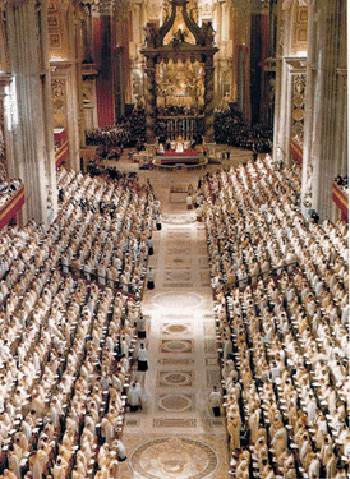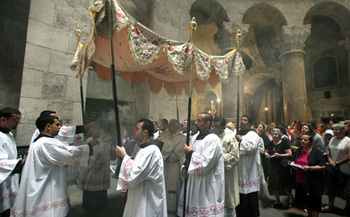Traditionalist Issues
 |
 |
 |
 |
 |
 |
 |
Monolithic Infallibility &
Differences among Anti-progressivists
1. The Catholic world owes much to the simple people who preserve the true faith, as well as to the anti-progressivist writers and men of action who in recent decades have amply developed doctrines and actions in defense of the sacred deposit of Tradition. The deepening of traditional principles has been remarkable in various fields of theology, especially in ecclesiology and liturgy. Anti-progressivists have also fought in the practical field of Catholic life with a heroic effort, which I hope the future history of the Church will recognize with due justice.
Divergences in anti-progressivists circles
 2. However, many disagreements have arisen among anti-progressivists both in theory and in practice. Some unconditionally accept Vatican Council II, others do not. Some call themselves conservatives, others traditionalists, others counter-revolutionaries. (1) Some say that Pope Honorius was a heretic, others deny it. Analogous differences exist regarding many events in the history of the Church. Many adopt some modernist doctrinal theories, to the point of steering away from orthodoxy, while still calling themselves traditionalists. Thus we have these different ways of viewing matters, which often result in serious personal animosities.
2. However, many disagreements have arisen among anti-progressivists both in theory and in practice. Some unconditionally accept Vatican Council II, others do not. Some call themselves conservatives, others traditionalists, others counter-revolutionaries. (1) Some say that Pope Honorius was a heretic, others deny it. Analogous differences exist regarding many events in the history of the Church. Many adopt some modernist doctrinal theories, to the point of steering away from orthodoxy, while still calling themselves traditionalists. Thus we have these different ways of viewing matters, which often result in serious personal animosities.
3. At the present moment, it does not seem possible to reconcile positions so diverse and even opposed to one another. It is to be expected that over time, with the maturing of ideas and the influx of grace which cannot abandon the Church, true Catholics will move toward solid convictions; thus, submissive to the Magisterium as prescribed by Church law, the anti-progressivists will end by better harmonizing their positions, always respecting the old principle: in necessariis unitas, in dubiis libertas, in omnibus caritas [unity in necessary things; liberty in disputable matters; charity in all things ]
A monolithic infallibility?
4. There is a fundamental point of doctrine that we believe many of the eminent scholars of anti-progressivism and their followers fail to give due importance. It is the principle that there can be errors and heresies in documents of the papal and conciliar Magisterium that are not guaranteed by infallibility. (2) Indeed, this principle is generally absent from the conservative and traditionalist arguments that have nurtured and sustained the Catholic world with sound doctrine in recent decades.
5. To absolutely deny the possibility of error or even heresy in a papal or conciliar document not guaranteed by infallibility is to assign to it a monolithic character, which is not what Our Lord intended and did when He established it. These prefigures in the New Testament are clear: Peter’s boat almost capsized, being saved only by a miracle. Peter reneged Jesus Christ and was not at the foot of the Cross. As for the episode where St. Paul resisted St. Peter on the issue of Jewish rites, despite the most subtle explanations, it is undisputed that St. Peter “was worthy of blame” (Gal 2:11).
Non-infallible teachings
6. Unfortunately, in the history of papal infallibility, a simplistic and dichotomous division has frequently prevailed to this day, even among well-known traditionalist authors. According to it, in doctrinal matters the Pope can only speak: 1. as a private scholar, or 2. as making an infallible definition of the extraordinary Magisterium. For these authors “non datur tertium”, i.e. there is no other way the Pope can speak - there are only these two alternatives.
 This position leaves aside the third possibility, which is that of a public but not infallible magisterial pronouncement. Indeed, only from the 19th century onward did the notion of a non-infallible ordinary Magisterium become more explicit and established. Also, the Popes and the great doctors have deepened the precious and extremely rich doctrine that explains the ordinary Magisterium can enjoy infallibility when it is universal in time and space while also fulfilling the other conditions of infallibility.
This position leaves aside the third possibility, which is that of a public but not infallible magisterial pronouncement. Indeed, only from the 19th century onward did the notion of a non-infallible ordinary Magisterium become more explicit and established. Also, the Popes and the great doctors have deepened the precious and extremely rich doctrine that explains the ordinary Magisterium can enjoy infallibility when it is universal in time and space while also fulfilling the other conditions of infallibility.
7. Known authors of the Neo-Scholasticism who combated Liberalism, Modernism and related heresies have stressed the papal teaching authority, seeming to imply a monolithic infallibility, which presumably would be absolute under all circumstances, as if it did not depend on certain conditions, even those expressly declared at Vatican I. However, analyzing these authors of Neo-Scholasticism, one finds that while they may express these concepts with greater precision, they also make it clear that papal pronouncements may not express the truth in times of crisis or in other extraordinary circumstances. In this respect, what is true of a Pope also applies, mutatis mutandis, to a Council (3)
8. Some claim that, although not always guaranteed by infallibility, a papal or conciliar doctrinal pronouncement cannot contain errors. This position is better stated as follows: “To say that a teaching is not infallible does not mean that it may have an error, but merely that it is not formally guaranteed by the charisma of infallibility. However, even if not assisted by infallibility, this teaching still has the assistance of the Holy Spirit, and, therefore, the principle stands that it cannot contain errors.”
The correct teaching, however, is completely different. This assistance promised to the Church can be absolute, ensuring the truth of the teaching, and it is so when the conditions for infallibility are met. However, when these conditions are not met, it is possible for man to refuse grace. And then the rule enunciated by St. Thomas applies: “That which may be and may not be, sometimes is not (quod potest esse et non esse, quandoque non est).” In sound logic, it is impossible to accept this inflated and monolithic notion of infallibility, which would lead to the absurdity of an “infallible fallible.”(4)
Distinguishing between heretic and “hereticizing”
 9. If there can be error or even heresy in papal and conciliar documents, a fortiori they may contain propositions that deserve less severe censure. Applying this principle to Vatican II, one sees that the problem is not just whether or not it contains formal heresies, but also whether or not, in face of Tradition, its final documents contain propositions that favor error or heresy; that have the flavor of error or heresy; that are offensive to pious ears, or that are scandalous or deserve other theological censures.
9. If there can be error or even heresy in papal and conciliar documents, a fortiori they may contain propositions that deserve less severe censure. Applying this principle to Vatican II, one sees that the problem is not just whether or not it contains formal heresies, but also whether or not, in face of Tradition, its final documents contain propositions that favor error or heresy; that have the flavor of error or heresy; that are offensive to pious ears, or that are scandalous or deserve other theological censures.
In a word, this is not just about knowing whether or not there are errors or heresies in the Vatican II Council, but also about of ascertaining whether or not it contains ‘hereticizing’ propositions [propositions leading to heresy] (5).
10. Obviously, an erroneous, heretical or hereticizing conciliar proposition is not incorporated into the patrimony of truths of the Faith because it does not meet the conditions of infallibility of the ordinary Magisterium. Such a proposition would be a failed declaration of the Council, which does not enjoy monolithic infallibility. Moreover, if various hereticizing propositions occur, hinged together in the same system, they also could not be incorporated into Church doctrine.
Conclusion
11. I understand that the arguments from Scripture and Tradition that support the doctrine on the possibility of error and heresy in non-infallible papal and conciliar documents are apodictic. On the other hand, the notion of a monolithic infallibility inspires most of the sede-vacantists as well as the neo-conciliar supporters who attach dogmatic authority to Vatican II. This notion is also at the root of the doubts, perplexities and troubles that torment many Catholics. I imagine that a full clarification of this matter would be a factor of convergence to help eliminate misunderstandings and reduce existing doctrinal and practical differences between anti-progressivist thinkers and movements.
This article was first posted on the site
Bonum Certamem

Divergences in anti-progressivists circles

There are divergences among conservatives & traditionalists
3. At the present moment, it does not seem possible to reconcile positions so diverse and even opposed to one another. It is to be expected that over time, with the maturing of ideas and the influx of grace which cannot abandon the Church, true Catholics will move toward solid convictions; thus, submissive to the Magisterium as prescribed by Church law, the anti-progressivists will end by better harmonizing their positions, always respecting the old principle: in necessariis unitas, in dubiis libertas, in omnibus caritas [unity in necessary things; liberty in disputable matters; charity in all things ]
A monolithic infallibility?
4. There is a fundamental point of doctrine that we believe many of the eminent scholars of anti-progressivism and their followers fail to give due importance. It is the principle that there can be errors and heresies in documents of the papal and conciliar Magisterium that are not guaranteed by infallibility. (2) Indeed, this principle is generally absent from the conservative and traditionalist arguments that have nurtured and sustained the Catholic world with sound doctrine in recent decades.
5. To absolutely deny the possibility of error or even heresy in a papal or conciliar document not guaranteed by infallibility is to assign to it a monolithic character, which is not what Our Lord intended and did when He established it. These prefigures in the New Testament are clear: Peter’s boat almost capsized, being saved only by a miracle. Peter reneged Jesus Christ and was not at the foot of the Cross. As for the episode where St. Paul resisted St. Peter on the issue of Jewish rites, despite the most subtle explanations, it is undisputed that St. Peter “was worthy of blame” (Gal 2:11).
Non-infallible teachings
6. Unfortunately, in the history of papal infallibility, a simplistic and dichotomous division has frequently prevailed to this day, even among well-known traditionalist authors. According to it, in doctrinal matters the Pope can only speak: 1. as a private scholar, or 2. as making an infallible definition of the extraordinary Magisterium. For these authors “non datur tertium”, i.e. there is no other way the Pope can speak - there are only these two alternatives.

Peter's denial of Christ is a clear precedent that not all the actions of a Pope are infallible
7. Known authors of the Neo-Scholasticism who combated Liberalism, Modernism and related heresies have stressed the papal teaching authority, seeming to imply a monolithic infallibility, which presumably would be absolute under all circumstances, as if it did not depend on certain conditions, even those expressly declared at Vatican I. However, analyzing these authors of Neo-Scholasticism, one finds that while they may express these concepts with greater precision, they also make it clear that papal pronouncements may not express the truth in times of crisis or in other extraordinary circumstances. In this respect, what is true of a Pope also applies, mutatis mutandis, to a Council (3)
8. Some claim that, although not always guaranteed by infallibility, a papal or conciliar doctrinal pronouncement cannot contain errors. This position is better stated as follows: “To say that a teaching is not infallible does not mean that it may have an error, but merely that it is not formally guaranteed by the charisma of infallibility. However, even if not assisted by infallibility, this teaching still has the assistance of the Holy Spirit, and, therefore, the principle stands that it cannot contain errors.”
The correct teaching, however, is completely different. This assistance promised to the Church can be absolute, ensuring the truth of the teaching, and it is so when the conditions for infallibility are met. However, when these conditions are not met, it is possible for man to refuse grace. And then the rule enunciated by St. Thomas applies: “That which may be and may not be, sometimes is not (quod potest esse et non esse, quandoque non est).” In sound logic, it is impossible to accept this inflated and monolithic notion of infallibility, which would lead to the absurdity of an “infallible fallible.”(4)
Distinguishing between heretic and “hereticizing”

The crux of the question is facing the possibility of error or heresy at a Council
In a word, this is not just about knowing whether or not there are errors or heresies in the Vatican II Council, but also about of ascertaining whether or not it contains ‘hereticizing’ propositions [propositions leading to heresy] (5).
10. Obviously, an erroneous, heretical or hereticizing conciliar proposition is not incorporated into the patrimony of truths of the Faith because it does not meet the conditions of infallibility of the ordinary Magisterium. Such a proposition would be a failed declaration of the Council, which does not enjoy monolithic infallibility. Moreover, if various hereticizing propositions occur, hinged together in the same system, they also could not be incorporated into Church doctrine.
Conclusion
11. I understand that the arguments from Scripture and Tradition that support the doctrine on the possibility of error and heresy in non-infallible papal and conciliar documents are apodictic. On the other hand, the notion of a monolithic infallibility inspires most of the sede-vacantists as well as the neo-conciliar supporters who attach dogmatic authority to Vatican II. This notion is also at the root of the doubts, perplexities and troubles that torment many Catholics. I imagine that a full clarification of this matter would be a factor of convergence to help eliminate misunderstandings and reduce existing doctrinal and practical differences between anti-progressivist thinkers and movements.
- On these distinctions check here
- See Arnaldo Xavier da Silveira, La Nouvelle Messe de Paul VI: Qu’en Penser?, Chiré-en-Montreuil : 1975, Diffusion de la Pensée Française, Part II, chaps. IX and X, and works cited therein
- “In the case of a pope and an ecumenical council the criterion for infallibility is not essentially different. In both cases, in fact, the intention of involving their authority can be expressed either partially or irrevocably. It is only this latter intention that constitutes a secure criterion of infallibility.” (Charles Journet, L’Eglise du Verbe Incarné, Desclée de Brouwer, 3rd ed., 1962, vol. I, p. 578, n. 1)]
- Expression by Jean Madiran, in “Le faillible infaillible : l’analyse de Jean Madiran,” in La Riposte Catholique, 11/27/2012.
- One can ask whether what I am writing clashes with the appeal of Benedict XVI, in a speech to the Roman Curia of December 22, 2005, to interpret the Council according to a “hermeneutic of reform in continuity.” On that same occasion, he also declared that acceptance of Vatican II “by a great portion of the Church,” that is, by anti-progressivists, depends “on the right key to interpretation and application.”
In a spirit of religious and filial submission to the living Magisterium to the fullest extent imposed by Catholic doctrine, I say that the doubts and polemics about Vatican II, which for decades have filled faithful Catholics with perplexity, would certainly be reduced or perhaps even disappear if His Holiness were to declare, in a more specific way than he has done so far and in an absolutely precise manner, what this “key” for interpreting the Council as “reform in continuity” is. By its nature, this statement must clarify whether or not it is theologically possible for erroneous, heretical or hereticizing propositions to exist in conciliar teachings of a doctrinal character that do not meet the requirements of infallibility.
Bonum Certamem

Posted February 15, 2013
______________________
______________________











